In 2025, the global PropTech market was valued at approximately $40.2 billion and it’s poised to nearly double by 2032. Clearly, PropTech acts as the modern remedy for real estate specialists suffering from piles of paperwork and a high-yield asset class for investors looking for fresh opportunities.
To help you navigate this rapidly expanding industry, here’s what you’ll explore next:
We also look at real estate AI and reflect on how technology has changed the real estate industry.
What Is Proptech?
Property Technologies or PropTech is a combination of technological advancements to enhance the way properties are bought, sold, managed, and experienced through cutting-edge software, AI solutions, and digital platforms. These innovative technologies are also known as:
- Real Estate Tech (ReTech)
- Property Technology
- Real Estate Technology
- Commercial Real Estate Technology (CRE Tech)
- RealTech
However, at its core, prop tech always means robust alignment between real estate and technology.
PropTech Examples and Categories
1. Real Estate Platforms
- Zillow: Online real estate marketplace for buying and selling properties;
- Zoopla: UK-based property portal and valuation platform;
- Airbnb: Short-term rental marketplace platform.
2. Property Management Software
- Buildium: Comprehensive property management platform for residential properties;
- AppFolio: Cloud-based property management software for single-family and multifamily buildings;
- Commercial property management: Software for office and retail property operations.
3. AI-Powered Real Estate Solutions
- Automated data entry systems;
- Document abstraction and processing;
- Smart property matching algorithms;
- Predictive analytics for property values.
4. Specialized Real Estate Software
In fact, real estate marketplaces and portals were the first proptech tech companies that disrupted the real estate industry back in the 2000s. They all once took the plunge and married technology and real estate by allowing users to showcase their properties online.
In many ways, the proptech definition overlaps with several other sectors, namely:
- Shared Economy Real Estate – any proptech platform that offers shared and/or joint use of a property. AirBnB and WeWork are the most famous Proptech companies driving shared economy.
- Smart Real Estate (aka Smart Homes) – a purely prop tech subsector denoting the use internet-connected devices and appliances, which are collectively known as the Internet of Things (IoT), to enable the remote monitoring and management of the house. Some of the obvious examples of solutions in this proptech subsector include smart kitchen appliances developed by Siemens or intelligent lighting systems produced by Philips.
- Fintech (financial technology) – the elder brother of proptech that brings technology into the financial sector to make customers and businesses access financial services with ease. The two industries meet at Real Estate Fintech focused on facilitating financial processes in Real Estate.
- Contech (construction technology) – the use of modern materials and sustainable approaches in building.
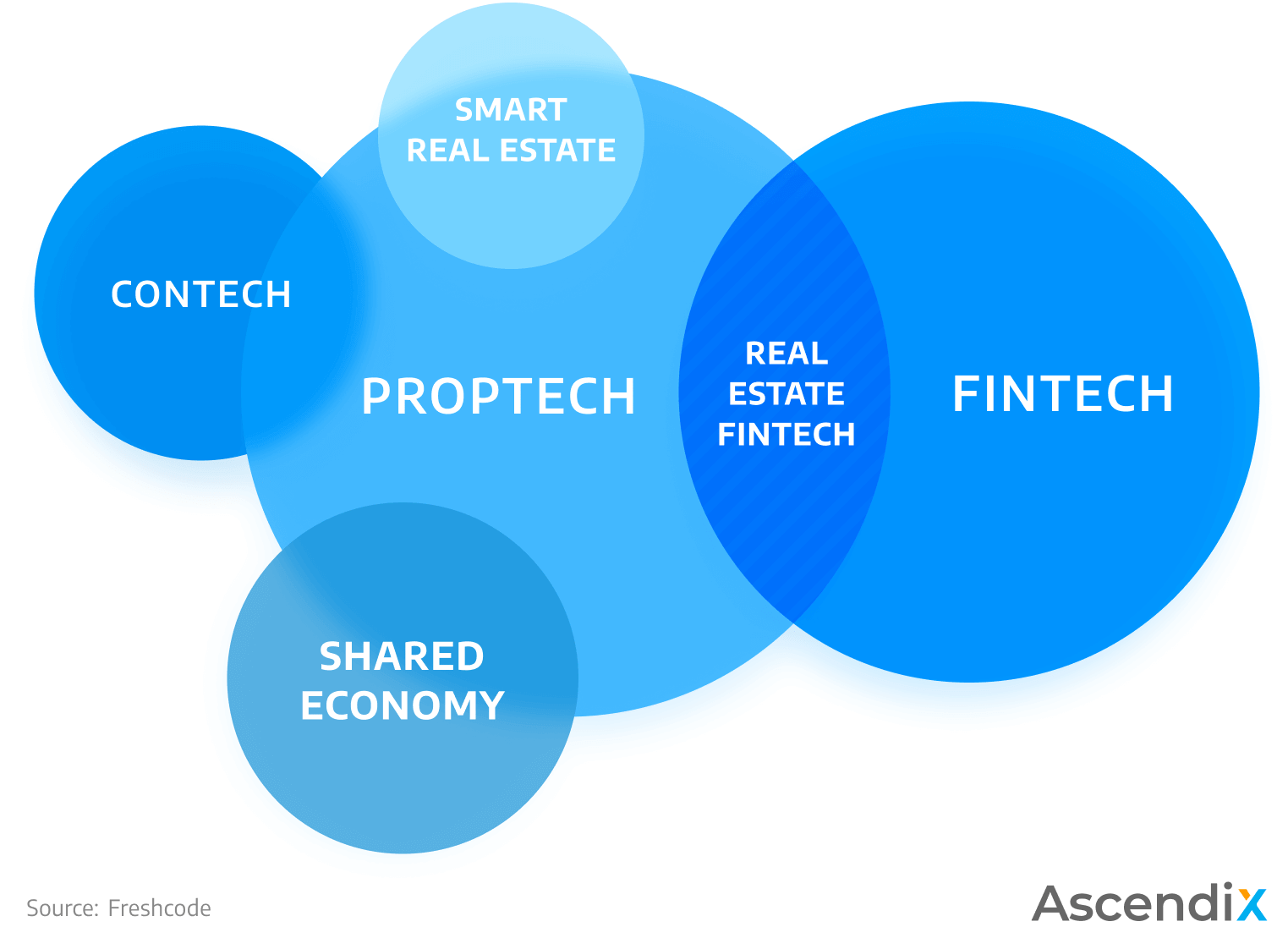
Proptech Definition | Ascendix Tech
What is the Outlook for the PropTech Industry?
Current Market Size: The PropTech market is valued at $40.19 billion in 2025.
Future Market Size: The PropTech market is projected to reach $133.05 billion by 2032.
Growth Rate: The PropTech industry will experience significant growth driven by AI, big data, IoT, and sustainable technologies.
Global PropTech Companies: There are more than 9,000 PropTech companies worldwide as of 2025.
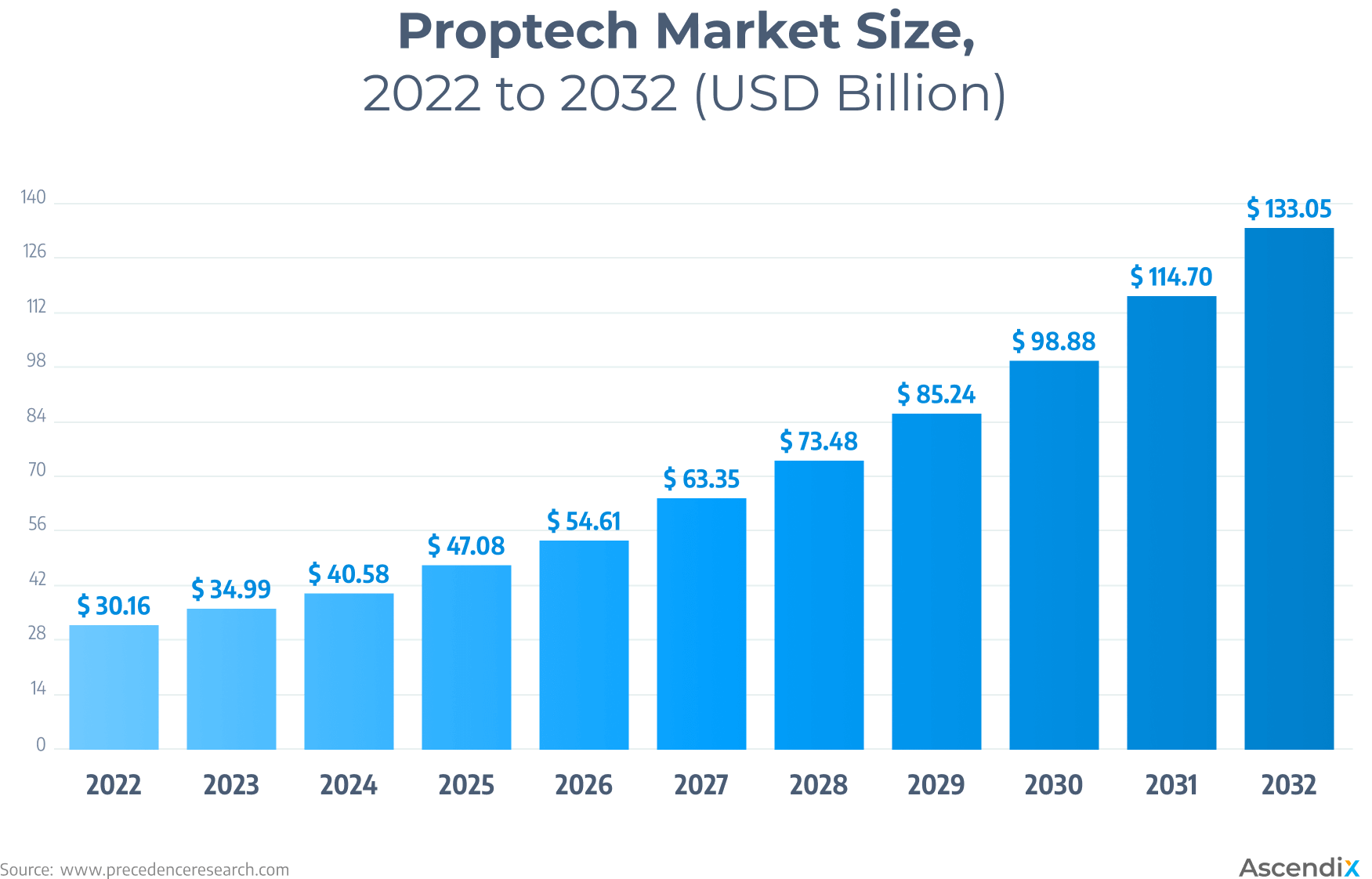
Proptech Market Size
North America currently leads in PropTech initiatives, but regions such as Europe (the UK has 805 companies, France has 547, and Germany has 342), and Asia are rapidly catching up, indicating a global expansion and increasing adoption of technological advancements in real estate.
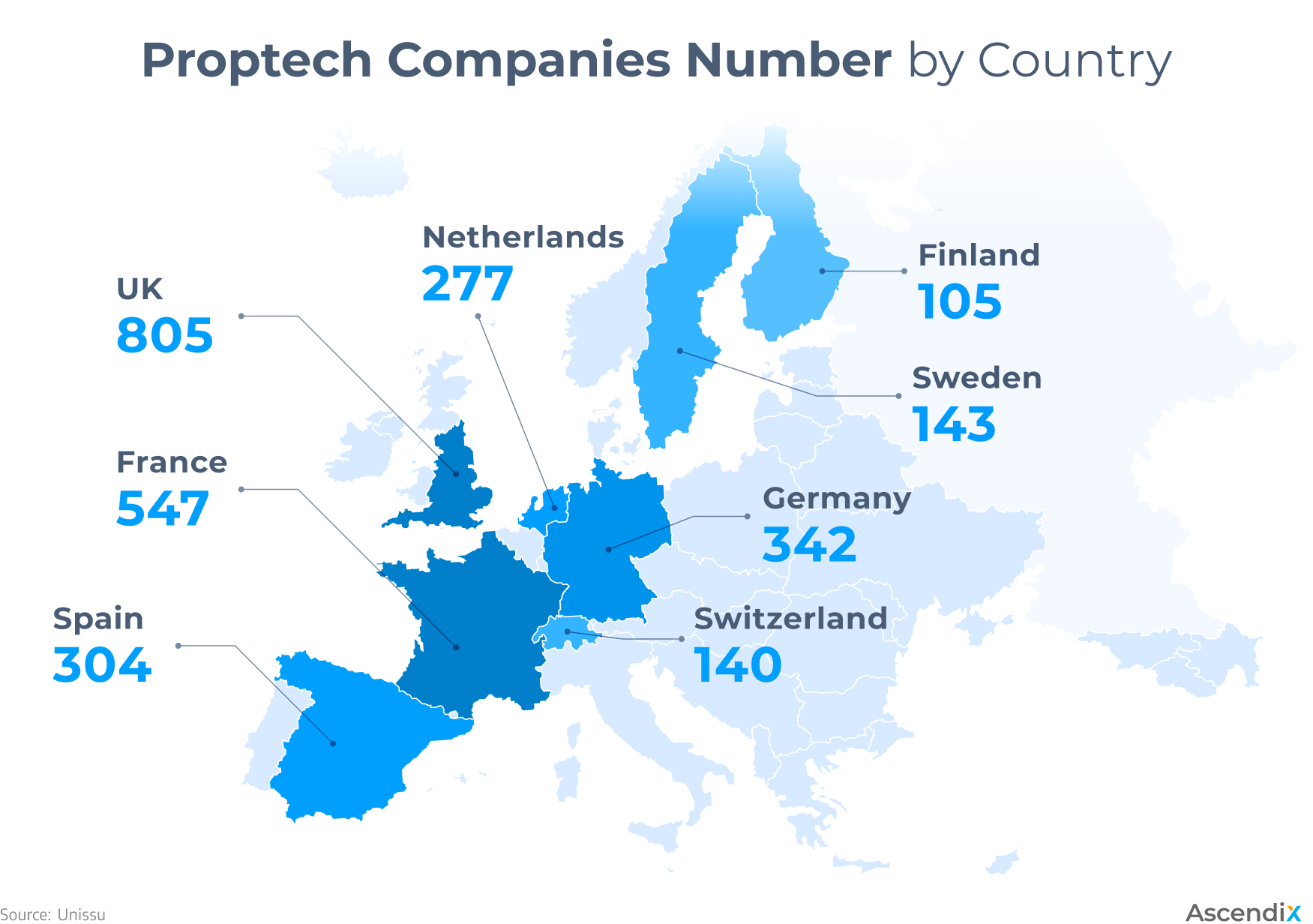
Proptech Companies Number by Country
If you want to develop a proptech solution from scratch and need to research the market situation by country, check our Proptech Software Development Guide.
How Many Proptech Types Are There?
As of 2025, there were over 10,000 PropTech companies globally, half of which are startups. These companies are primarily located in North America (≈60%), followed by Europe (≈27%), and Asia (≈3.5%).
Having been in the real estate industry for almost two decades, Ascendix has witnessed the evolution of property technology in real estate and is well-positioned to provide our outlook on the proptech industry.
Our proptech landscape map consists of seven distinct segments and considers the workflows and needs of all real estate professionals:
| PropTech Category |
Key Focus |
| Tools for Real Estate Agents and Brokers |
Software & platforms enabling agents to manage clients, listings, and transactions. |
| Solutions for Property Managers and Facility Operators |
Tech to optimize daily operations of residential and commercial properties. |
| PropTech FinTech (Financial Technology) |
Financial services embedded in real estate transactions and investment processes. |
| Construction Technology (ConTech) |
Solutions for construction, development workflows, and building management efficiency. |
| Investment and VC Solutions |
Platforms supporting real estate investment, venture capital, and portfolio oversight. |
| Climate Technology (ClimateTech) |
Sustainable, eco-focused PropTech targeting energy and environmental performance. |
| Universal PropTech Solutions |
Technology that serves a wide range of real estate professionals, regardless of role. |
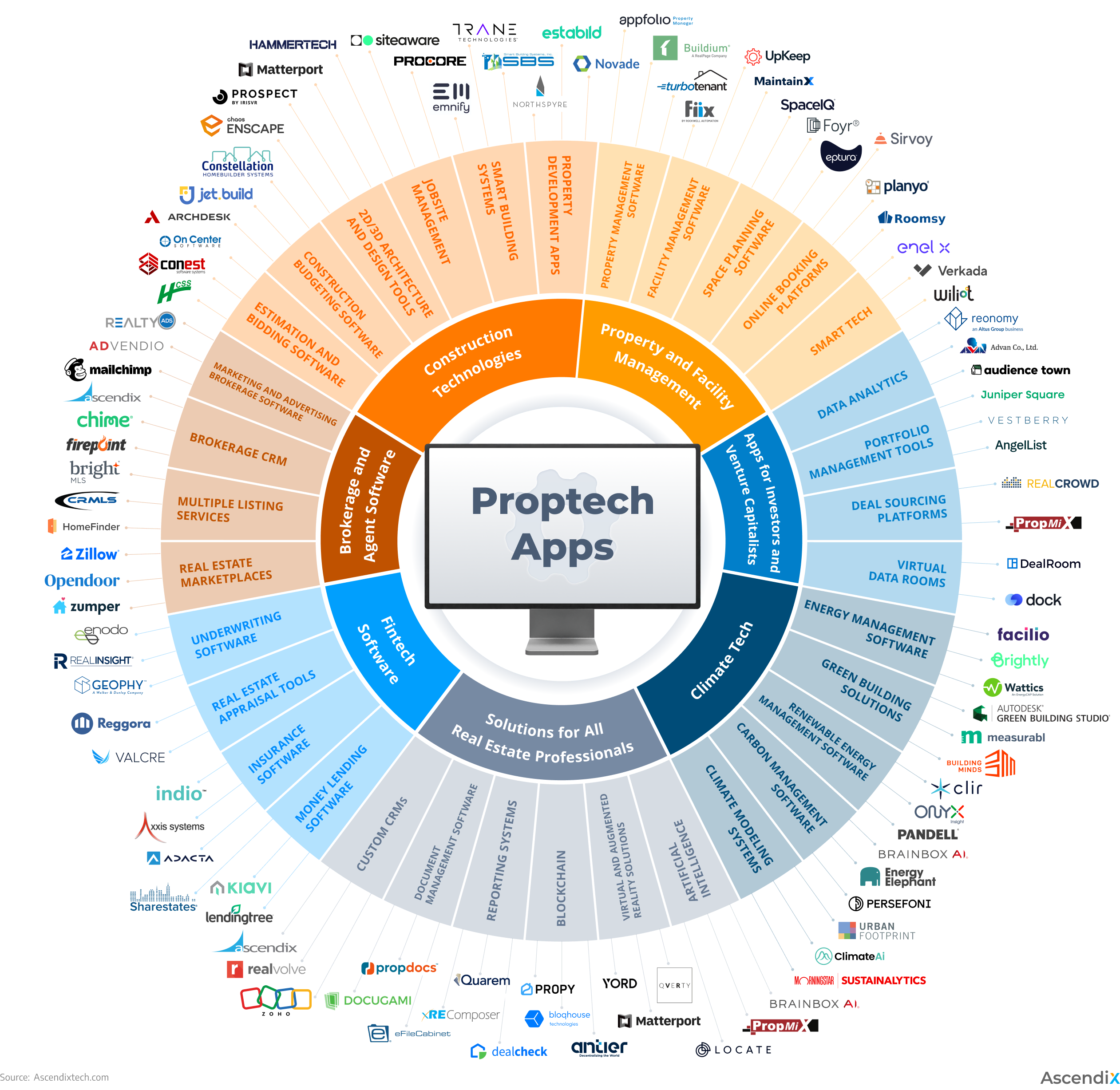
Proptech Definition | Proptech Landscape
Find out more about proptech examples in the dedicated article on Proptech Market Map.
Residential vs. Commercial Property Tech
PropTech can be understood through two main categories based on property type:
- Residential: living spaces like apartments and houses that can be listed on marketplaces, rental platforms, smart-home systems, and lending tools.
- Commercial: business properties such as office buildings, retail spaces, and industrial facilities, which are managed using tools like smart building systems, CRE marketplaces, facility management software, and analytics platforms.
The Residential Property Tech landscape is defined by:
- Single-family property search platforms – multiple listing services and real estate marketplaces, both for rentals and buying/selling (Roofstock, Doorvest, Zumper, RightMove);
- Short-term rental platforms (Airbnb, Lyric)
- Single-family property management tools designed for landlords (TurboTenant);
- VR and AR Tools – 3D virtual property tours (View Labs);
- Crowdfunding platforms allowing individuals to invest in residential real estate (Sharestates);
- Real estate tokenization platforms offering individual investors an opportunity to invest in real estate through blockchain technology (SoluLab, Fireblocks);
- Smart home solutions – energy management software (Facilio), IoT-powered tools (Frigate, Homebase AI), AI-powered voice control systems (Josh AI);
- Mortgage lender software – money lending platforms designed for lenders providing mortgages for the residential property (LendingTree, Kiavi);
- Loan management systems – tools for loan application and management, underwriting and appraisal (Enodo and GeoPhy);
- Marketing and advertising brokerage software (Mailchimp, ADvendio, Composer);
- Title and insurance management tools (Doma, Axxis Systems).
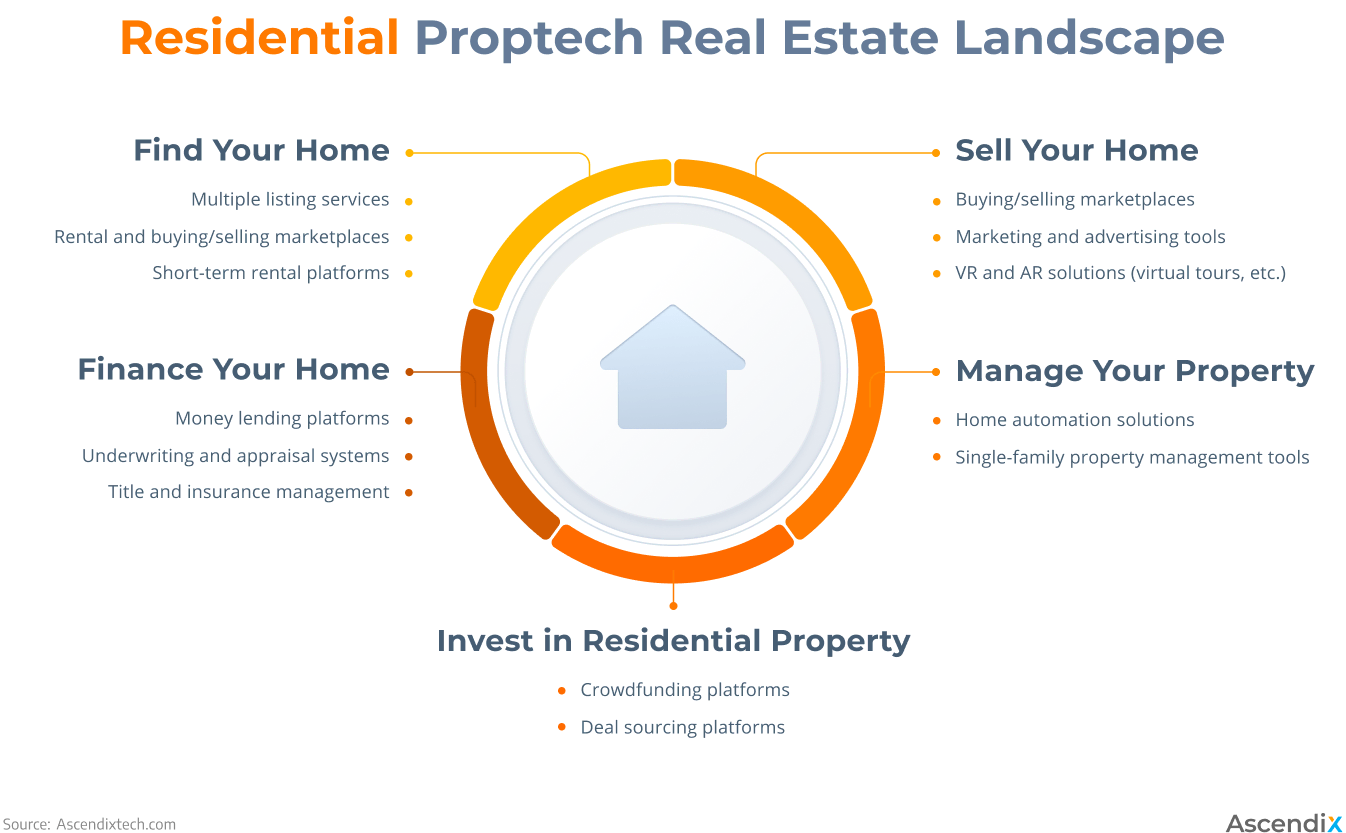
Residential Proptech Real Estate Landscape
CRE property tech stands for commercial property technology and means the use of all the innovative tools companies and individual commercial real estate professionals use to efficiently run, search, rent, and sell office buildings as well as industrial and retail property assets.
The brightest illustrations of this realm of proptech real estate in action are marketplaces for brokers and real estate agents like LoopNet and Biprox.
The Commercial Property Tech space is shaped by:
- Property search platforms – multiple listing services and marketplaces (Bright MLS, Zillow), brokerage CRM (Ascendix RE), etc.
- Construction Tech – property development tools (Estabild, Northspyre), smart building systems (Emnify, Prescriptive Data), estimation and budgeting software (Jet.Build), 2D/3D architecture and design solutions (Enscape, Iris VR), job site management tools (HammerTech, SiteAware);
- Commercial real estate CRM (AscendixRE, Buildout CRM);
- Evaluation and financing tools – underwriting software (RealINSIGHT), appraisal tools (Reggora, Valcre), and automated valuation models (Quantarium);
- Proptech facility management tools (RentRedi, UpKeep);
- Space and asset management tools (SpaceIQ, Foyr, TRIGIGA);
- ClimateTech – energy management software (Energy Elephant), carbon management software (Persefoni), climate modeling systems (ClimateAI), AI-powered real estate solutions like energy intelligence platforms (DEXMA);
- Online booking platforms (Sirvoy, Roomsy);
- Solutions for investment and venture capital funding management – proptech analytics software (Advan Research, Audience Town), portfolio management tools (Juniper Square), deal sourcing platforms (RealCrowd), virtual data rooms (DealRoom, Ascendix MarketSpace).
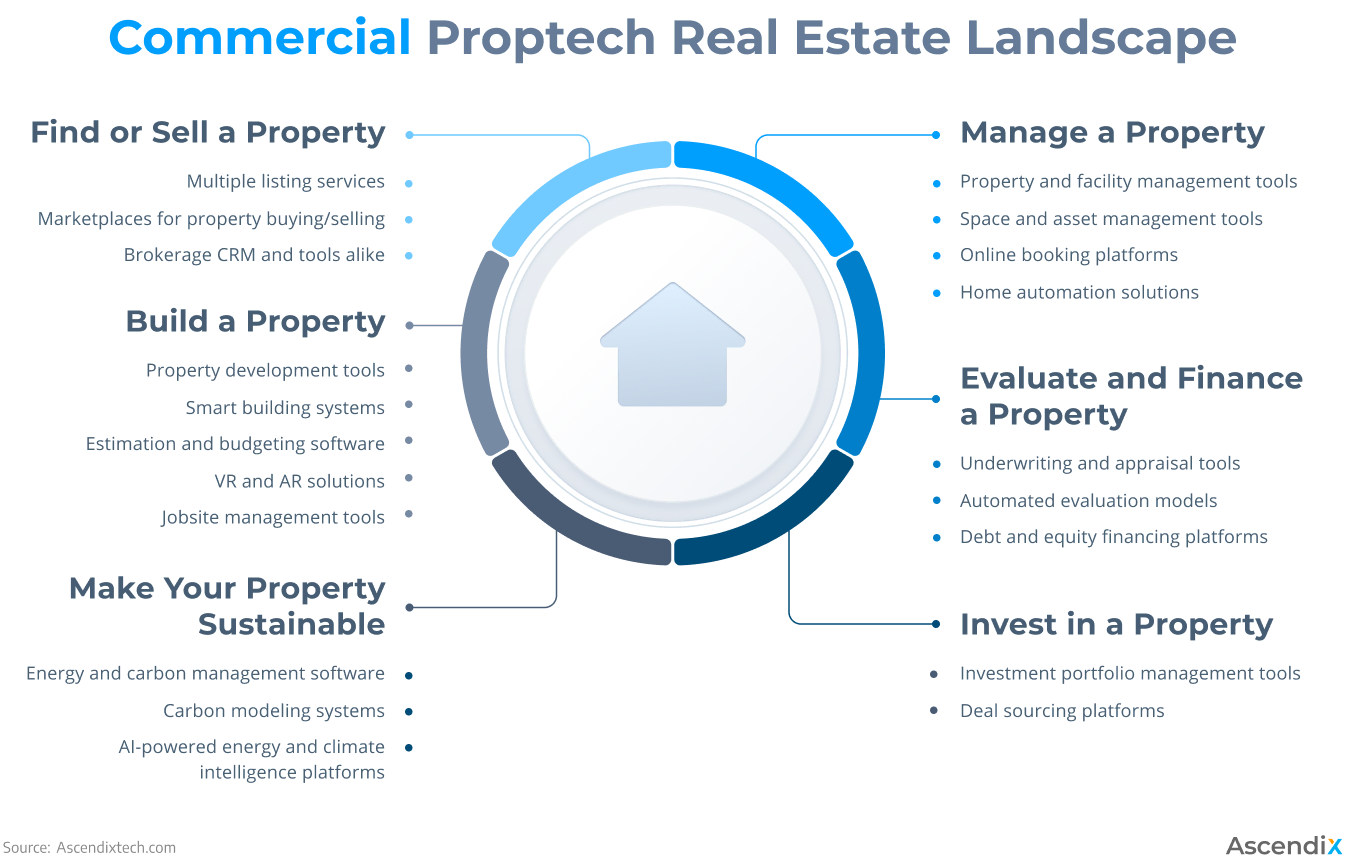
Commercial Proptech Real Estate Landscape
So, whereas residential proptech is aimed at facilitating owning, renting, buying/selling, and investing in single-family homes and features tools both for individual landlords and agencies, commercial prop tech is all about driving efficiency in the commercial real estate sector and includes tools designed for businesses, rather than solo landlords and tenants.
Revolutionize Your Business With Proptech
Contact our team to start your custom real estate software development.
What Are Real Estate Technology Trends Shaping Proptech Future?
The key real estate technologies shaping the future of prop tech include:
Artificial intelligence and machine learning;
- Big data analytics
- Virtual reality;
- Internet of Things (IoT);
- ClimateTech and GreenTech;
- Blockchain and tokenization.
Although real estate has always been a stranger in the world of innovation and technology, property tech startups, popping up here and there over the last decade, started to bridge the gap between technology and real estate.
PropTech Industry Predictions in 2025
To get a full picture of the recent technology development in property management in 2025 and answer what is proptech and how it will change, we’ve analyzed a few predictions for the property tech in real estate sector made by the world’s visionary leaders, such as Forbes, KPMG, and JLL.
Here are the 16 Technology Trends in Real Estate shaping the future of Proptech and answering what is proptech industry and what to expect from it soon:
1. AI and Machine Learning for Automation of Back-office Processes
With artificial intelligence and machine learning revolutionizing industries worldwide, companies have invested around $100 billion in AI-powered real estate tech development, whether through the creation of new solutions from scratch or the addition of AI-powered modules to existing software.
Whereas Big Data in Real Estate is about structuring large amounts of data and has gained huge popularity in the last few years, artificial intelligence and machine learning are about leveraging data with automation and, as a trend, have won the race.
From robust search prediction functionality to autogenerating personalized email sequences to customers based on their life events, AI will do the job for you!
Currently, the development of the AI real estate market is extremely different and can be found in the most varied directions. Let’s discover more details about these proptech examples.
“ Here's an important lesson for any enterprise, commercial real estate or otherwise, who's thinking, “How do I implement AI?” Instead of that, ask yourself “What can I do to impact my business the most now? What is a pain point that I can address?” Don't try to go out and just think, “Oh, this will be cool.” Don't do that. You can't try to do everything at once. Pick one or two or three pain points that you need to solve and see if AI is ready to solve that pain. It may not be. That is the recipe for a successful introduction of AI in your organization. ”
Todd Terry, Co-Founder and Managing Partner of Ascendix
AI Brokerage Tech
AI brokerage tech is a technology designed to enhance the efficiency and effectiveness of brokerage services in real estate through the power of AI.
The technology is most often represented by intelligent brokerage platforms and similar comprehensive tools which cover the majority of brokers’ operations.
AI property technology solutions are primarily used by brokers and real estate agencies to streamline property search and decision-making.
By using AI-generated insights which are based on the system data, brokers can quickly identify high-performing locations and generate property listings that will have maximum visibility and appeal, thereby closing deals faster and optimizing client experience.
Some of the examples in the AI brokerage technology are brokerage intelligence platforms (LocateAI), listing generation tools (Listing Copy AI), lead generation and nurturing platforms (Ylopo), transaction management software (Dotloop), virtual staging tools (VirtualStaging.ai), 3-D visualized tools (part of Zillow platform), and many more.
AI technologies for appraisal are a new step in the way how properties are valued and loans are processed. These systems use AI/ML models, trained on relevant structured and unstructured data, to provide more accurate property valuations faster and streamline loan origination processes.
Some commonly used AI valuation proptech examples are robotic software and cobots (Silverwork Solutions), automation evaluation models (GeoPhy, Quantarium), underwriting and appraisal intelligence platforms (Enodo, FoxyAI), real estate appraisal tools (Zillow Zestimate), and more.
To find out more about what AI real estate valuation is and how it can be tailored specifically for your business needs, check out the post by Ascendix about AI real estate valuation.
AI Loan Origination
AI is used in loan origination to process and analyze structured and unstructured data (like credit scores, income statements, bank statements, transaction histories, etc.) to automate risk assessment, fraud detection, document verification, and compliance checks. This helps banks and other lending institutions to deliver instant pre-approvals, get faster loan origination, and streamline underwriting.
Examples of AI loan origination platforms are risk scoring and fraud detection tools (Zest AI), automated document collection and eligibility assessment platforms (Blend), AI tools for automated application intake and fast pre-approval (Better Mortgage), platforms for matching borrowers to optimal mortgage products (Zillow Home Loans), and software for contract review, workflow automation and key-term extraction (DocuSign).
AI for Property Management
AI can be used for property management, space management, and landlord-tenant interactions optimization.
AI real estate technologies in property management can streamline different spheres, from automating communication with tenants through AI chatbots to optimizing space utilization with smart IoT devices. The technology in this case contributes to better resource management and tenant relations.
Among common AI systems in this industry are space and property management tools (like TRIGIGA, AUtility), ethical tenant screening tools for hospitality (Rentberry, Certn, Autohost), automated chatbots for tenant communication (River), lease management platforms (AppFolio), etc.
AI Home Automation
AI home automation technology focuses on enhancing residential living with AI technologies in real estate that manage security and overall home functionality.
The first to benefit AI home automation are homeowners and landlords, as they get higher security, automated monitoring of home systems and smart proptech management.
As a result, residential property owners and residents get energy savings, enhanced safety, and improved home value.
Some examples of AI home automation are smart security tools (Frigate, Ring Video Doorbell, Nest Cam), smart building systems (Homebase AI), common voice-controlled assistants (Siri, Alexa, or Google Assistant), smart thermostats and IoT devices customized to the user’s preferences, and many more.
AI for Energy Resource Management
AI applications for energy resource management help real estate entities, both residential and commercial, utilize and conserve energy more efficiently.
Such platforms are a great choice for property developers and facility managers who want to optimize energy use and reduce environmental impact.
Apart from making the property more environmentally friendly, some other benefits include reduced energy costs, compliance with sustainability standards, and higher building efficiency.
The ready-made applications in this sphere are energy intelligence platforms (Gridium), renewable energy software (Clir Renewables), climate management platforms (Climate AI), real estate management platforms with IoT integration (Proptech OS), smart energy management platforms (Verdigris), etc.
AI for Real Estate Development and Construction
AI technologies in real estate development and construction can span through different spheres, including project management, design, and construction & engineering.
AI tools in construction can provide data-driven insights to enhance how construction and real estate development projects are planned and executed.
The examples of such apps are data management software (Versatile), interior design generation software (Interior AI), construction development management (Deepblocks), construction BIM platforms (Autodesk), 3D design creation platforms (Architectures), and many others.
Develop Custom Construction Software
Hire Ascendix. We understand the industry like nobody else. With over two decades of expertise in real estate and technology, we build innovative AI-powered software designed for construction needs.
AI Real Estate Investment Solutions
AI solutions for real estate investment can help individual investors and businesses in optimizing investment strategies and decision-making.
With the AI investment proptech solutions, real estate investors get data-driven insights and predictive analytics capabilities. They directly translate into better and more informed investment decisions, heightened efficiency in portfolio management, and higher returns on investment.
Some AI tools in real estate investment are real estate investment platforms (SkylineAI, HouseCanary), investment management tools (Canoe); investment analysis platforms (Mashvisor, DealCheck), virtual investment assistants (Redfin AI, EliseAI), and others.
Conversational Tools
Conversational AI tools such as chatbots and virtual assistants offer automated 24/7 interactive help to your existing and future clients and tenants.
Real estate agencies, brokers, and property managers who utilize AI chatbots and similar conversational prop tech tools get way more clients than the ones who don’t.
No surprise – their companies are online and ready to answer the question 24/7, which enhances communication and customer service and increases the chance of long-term client retention.
Widely used tools in the sphere of conversational AI are AI chatbots and textbots (Localize), virtual assistants (RoofAI), generative AI natural language chatbots for content creation (Epique, Write.Homes, ValPal), marketing-oriented chatbots (ControlHippo), appointment scheduling tools (GPTBots, Freddy AI).
Build a real estate AI chatbot with Ascendix – entrust your project to a professional.
Not sure yet? Discover how to build a property management chatbot in our article!
“ There have been false attempts for AI to come in, but they didn't have the infrastructure and the depth of tools. Everybody in real estate that we're talking to is taking more of a proactive effort to get educated on it. They know they need to position themselves for this reality, and if they don't, they know that they're going to be left behind. I think for technology companies, there is this need to step into the gap, and we have been doing that - not just studying up on these technologies but making investments in platforms and proofs of concept that are applied specifically to commercial real estate and residential real estate business problems, where AI can step in and help candidly be more efficient at the jobs that they're doing. ”
Wesley Snow, CEO of Ascendix
For more data, please consult our article on AI in real estate where we’ve conducted research on who are the main players at the forefront of AI in real estate, what are the most innovative solutions and how you can benefit from them.
Ready to Enhance Your Real Estate Software with AI?
Ascendix has 16+ years of experience in real estate technology and has developed customized AI tools specifically for real estate. Entrust your project to a real proptech expert!
Big Data is about collecting and analyzing real-time and historical data about all kinds of real estate assets, from residential households to complex commercial properties like corporate facilities and telecommunications.
With structured data sets, real estate companies and individual Proptech realtors can then come up with accurate insights on pricing, home-value trends, and even potential risks and failure.
3. Virtual Reality for a better online search & home-buying experience
According to a report by Goldman-Sachs, Virtual Reality will be at the top of Proptech disruption by 2025, with an estimated 1.4 million realtors relying on the technology by that time. This number makes up the bulk of the total professionals in this area today.
The application of VR in Real Estate may vary, from virtual tours of properties to augmented reality solutions for digitally adding furniture to the existing interior (like in roOomy).
4. Internet of Things (IoT) for predictive maintenance
The Internet of Things (IoT) refers to a “smart” network of devices and sensors that are constantly sending and receiving information about residential and commercial properties to track their overall state and predict failures. For example, property owners can monitor a building’s temperature, security, and maintenance through mobile devices and computers.
5. ClimateTech and GreenTech for sustainability
As we adopt the new ways of green construction, focused on building sustainable, energy-efficient homes, modern appliances are getting smarter, too, with SmartGrid refrigerators, washing machines, dishwashers, and micro ovens taking up the central place in our homes.
Amid the eager discussions of the necessity of sustainability in the largest proptech conferences, there is still a lot to come!
6. Blockchain and tockenization for affordable investments
With AI taking the lead in real estate tech empowerment, the proptech industry attention on blockchain has waded. Nonetheless, this trend has been on the rise for long enough to prove its potential to innovate the real estate market with decentralized and transparent processes in property buying, selling, and investing.
With property as a digital token, blockchain technologies have reduced barriers to entry and offered fractional ownership, overall making investments affordable to everyone regardless of their socioeconomic background.
Which real estate tech startups are changing the industry?
The number of real estate tech startups is soaring annually, with record-breaking 300% growth over the past decade, according to JLL. These solutions ease the hassle of listing search, property management, documenting, construction planning, and much more.
Since the number of Property Tech startups categories may go far beyond dozens, here’s our wrap-up list of 7 key types of property technology solutions with the key disruptors representing each subsector:
- Real Estate Agent and Brokerage Tools
- Property and Facility Management
- Construction Tech
- Fintech
- Investment and VC Tools
- Climate Tech
- Solutions Everyone Can Benefit from
1. Real Estate Agent and Brokerage Tools
Name: Locate AI
Type of Product: Brokerage intelligence proptech solution
Headquartered: San Francisco, the US
Founded: 2014
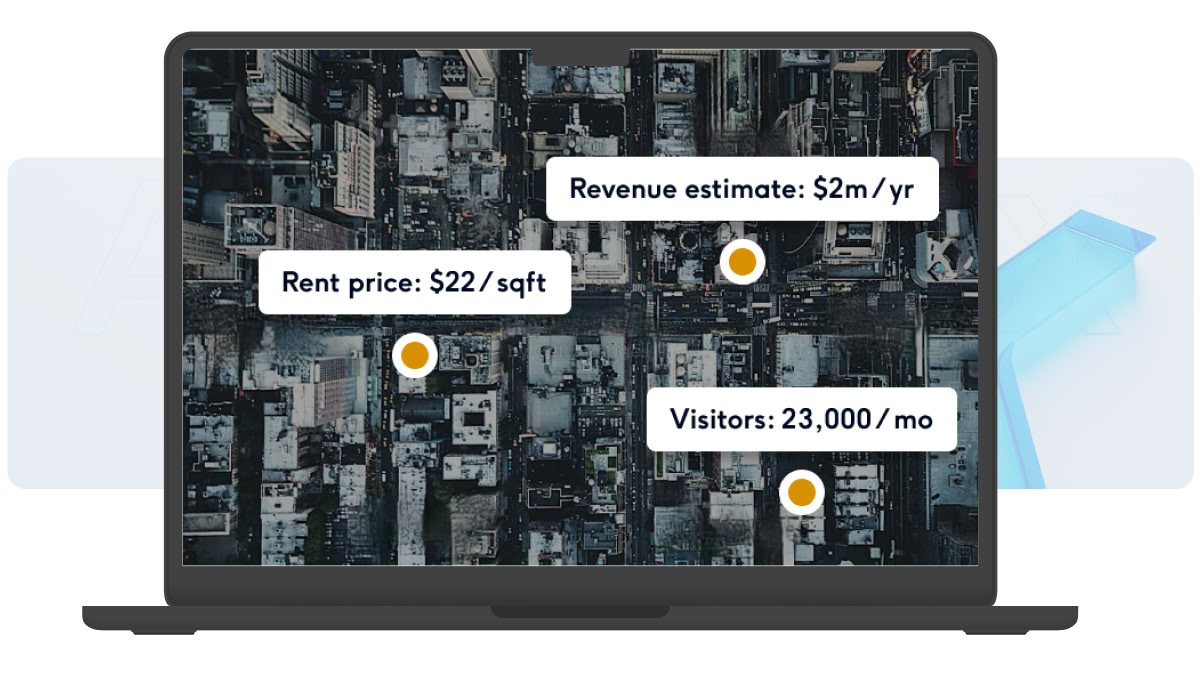
Locate AI
Locate AI has developed a brokerage intelligence platform that is a complex solution for landlords, brokers, and retailers. The company uses 200 million data points (like consumer profile and demographics) gathered from anonymous mobile devices on the national level to help real estate professionals identify the most high-performing location to invest in.
The main features of the Locate intelligence platform are as follows:
- AI-powered top market, neighborhood, and location analysis (it takes less than 5 minutes to assess the potential site performance);
- Smart reporting and predictive analytics;
- Smart deal tracking and management.
Request a Deep Analysis of Your Real Estate Software
Let tech expert with 16+ years of experience in real estate perform diagnostics and audit your software as well as development and delivery processes.
2. Property and Facility Management
Name: Eptura
Type of Product: Workplace and asset management platform
Headquartered: Atlanta, the US
Founded: 2022
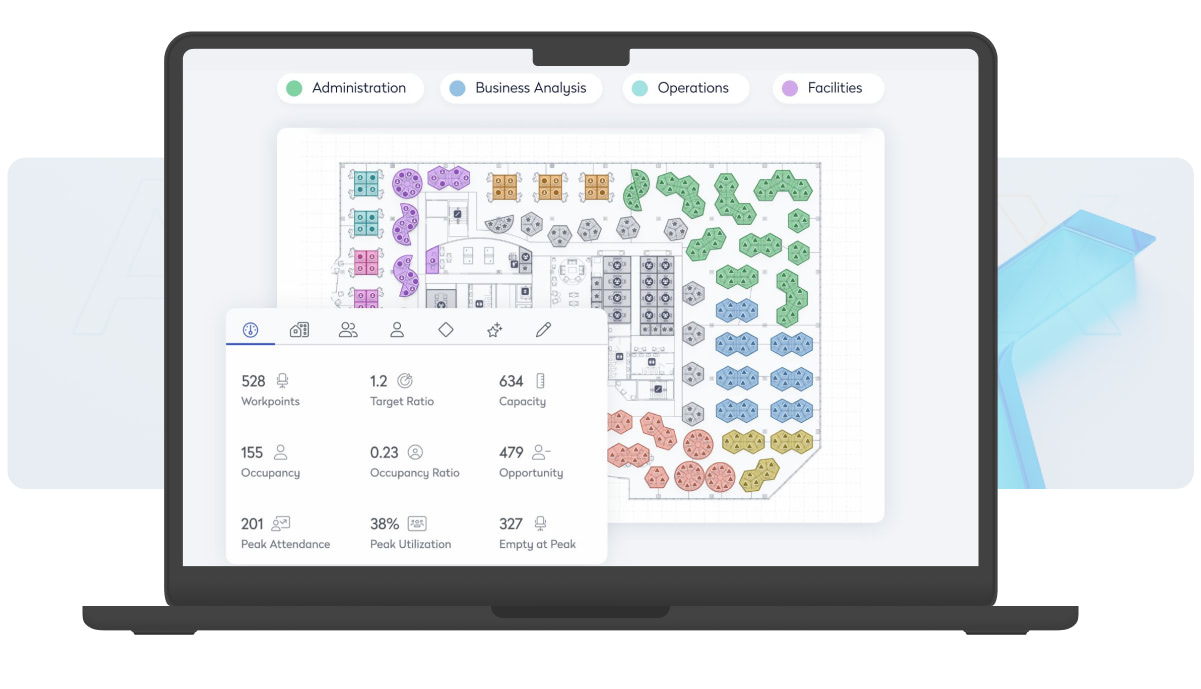
Eptura
Eptura has developed a workplace and asset management platform consisting of two company’s products, Eptura Workplace and Eptura Asset, that helps companies effectively manage facility hybrid work.
- Eptura Workplace offers features like visitor management, desk booking, and conference room scheduling. With Eptura Workplace modules, users can ensure smart facility management and space planning;
- Meanwhile, Eptura Asset is a tool that automates preventive maintenance and inventory tracking while offering BIM models for optimized planning and design.
3. Fintech
Name: FoxyAI
Type of Product: Image analysis and property valuation intelligence tool
Headquartered: New York, the US
Founded: 2018
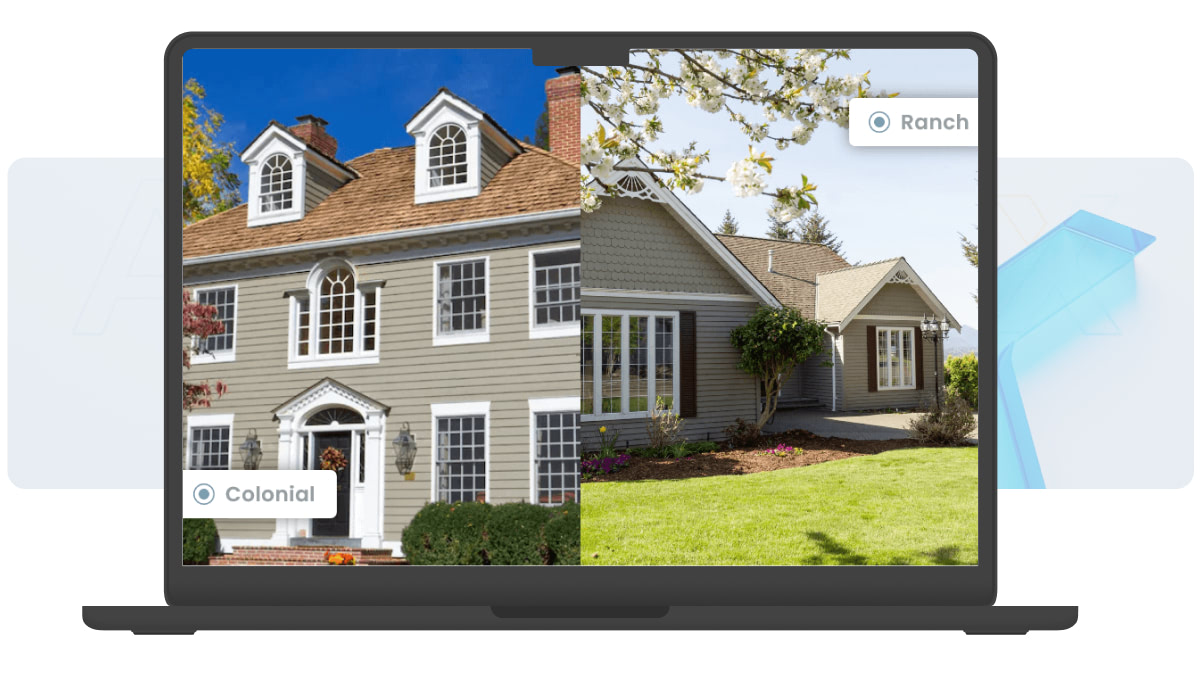
FoxyAI
One of latest startups in the realm where real estate and technology fuse, FoxyAI leverages AI, machine learning and data science to help users generate valuation reports based on the property image analysis made possible with FoxyAI’s visual property intelligence models.
Currently, the developer offers 2 solutions:
- FoxyAI 360 Property Valuations – A product used for object and damage detection, automated renovation estimates, and intelligent comparables & localized insights;
- FoxyAI Model Library – Different types of models like damage/exterior/interior models detect specific objects in the property videos or photos fed to the system.
4. Construction Tech
Name: CityBldr
Type of Product: Site management and data analytics solution
Headquarters: Bellevue, United States
Founded: 2016
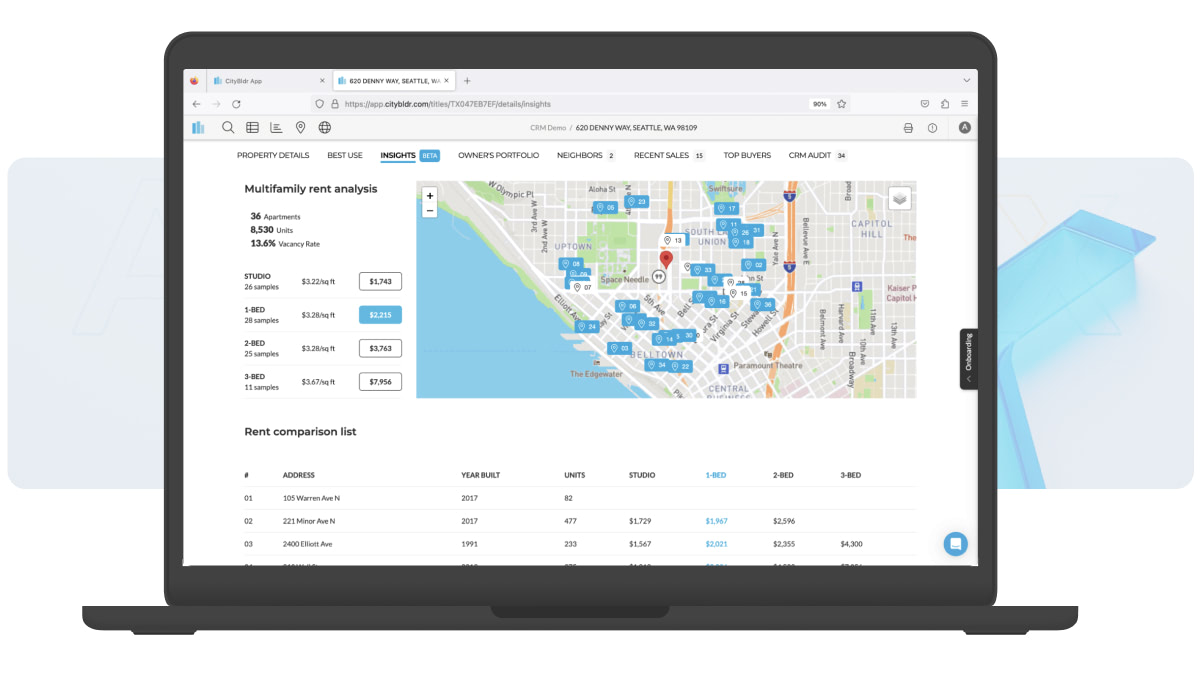
CityBldr
CityBldr provides 50 times faster workflows when it comes to the management of site and allows users to make profitable investments by leveraging smart data like zoning information, environmental indicators, parking requirements, etc.
This digital solution offers the following opportunities:
- Fast and accurate rent comparison, competitor & neighborhood analysis;
- A built-in CRM – users can centralize the property data and track any changes in it;
- Valid data points like zoning information and others.
5. Investment and VC Tools
Name: Entera
Type of Product: Investment management platform
Headquartered: Houston, the US
Founded: 2018
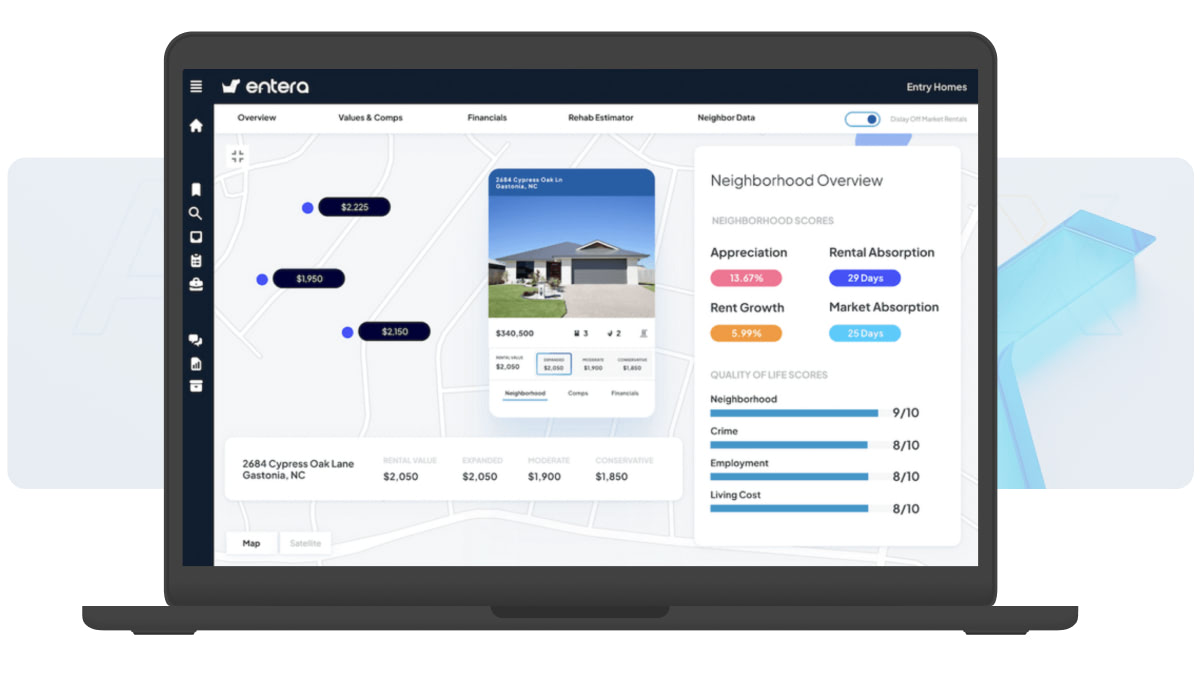
Entera
Entera is a residential real estate investing platform merging technology and real estate processes like buying, selling, and investing in single-family homes. It acts as a real estate marketplace where one can choose a property and assess the investment risk as well as forecast ROI.
So, what does an Entera solution include?
- An all-in-one residential single-home investment platform and marketplace;
- Risk assessment and ROI forecasting with predictive data analytics;
- AI-fueled transaction management;
- Service partner network for maximized returns.
6. Climate Tech
Name: Persefoni
Type of Product: Sustainability management software
Headquartered: Mesa, the US
Founded: 2020
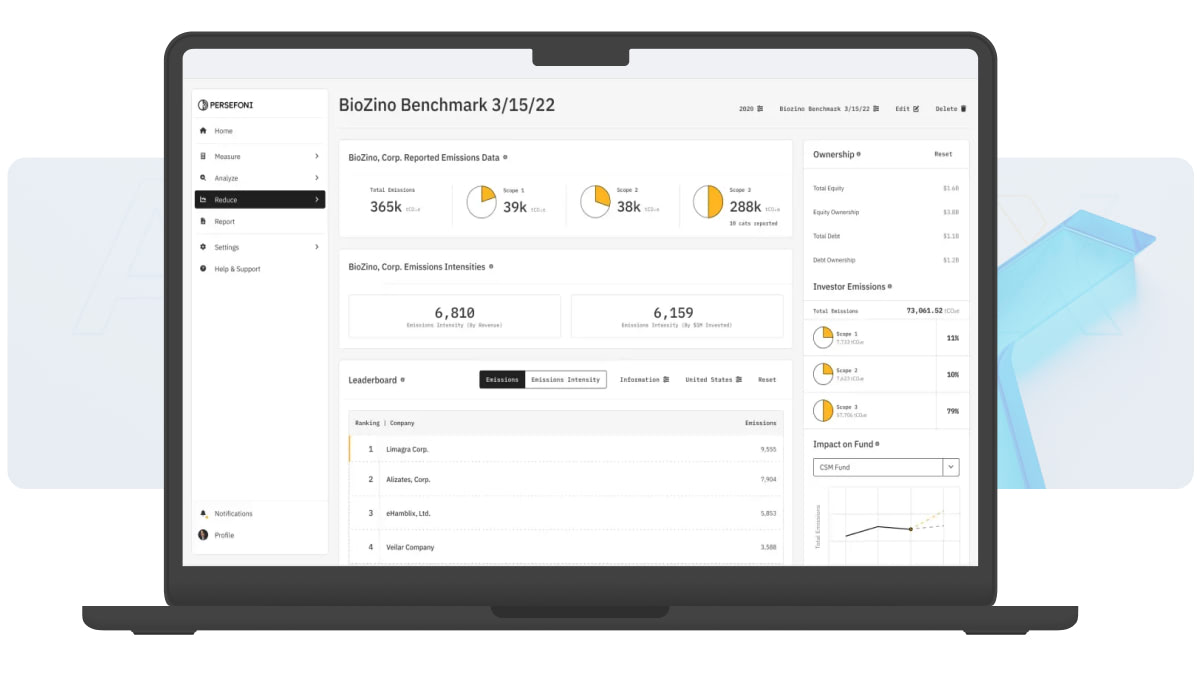
Persefoni
Founded by former corporate sustainability directors, Persefoni is a sustainability management software that helps companies get to the net zero destination faster.
To support companies during their decarbonization journey, Persefoni has developed a set of modules:
- Portfolio Analytics Suite. The module provides carbon insights with seven advanced dashboards. Users can create custom reports, visualize them and filter insights based on different metrics;
- Net Zero Navigator. The module provides users with customized decarbonization plans depending on the industry the company represents;
- Scope 3 Data Exchange. Due to this module, companies can collect emissions data from their suppliers, even if the latter aren’t a part of the Persefoni community, and analyze it before performing scope 3 calculations;
- Climate Impact Benchmarking. With features included in this module, companies can measure their carbon footprint against other industry players;
- Integration Hub. This module provides users with seamless integration of Persefoni Platform with must have applications required for smart data collection.
7. Solutions Everyone Can Benefit From
Yes, some solutions are universal and anyone in real estate can capitalize on them whether they are a fintech specialist, investor, agent, or broker. Let’s take a look at one of such startups.
Name: YORD Studio
Type of Product: VR and AR products for real estate
Headquartered: Prague, Czech Republic
Founded: 2019
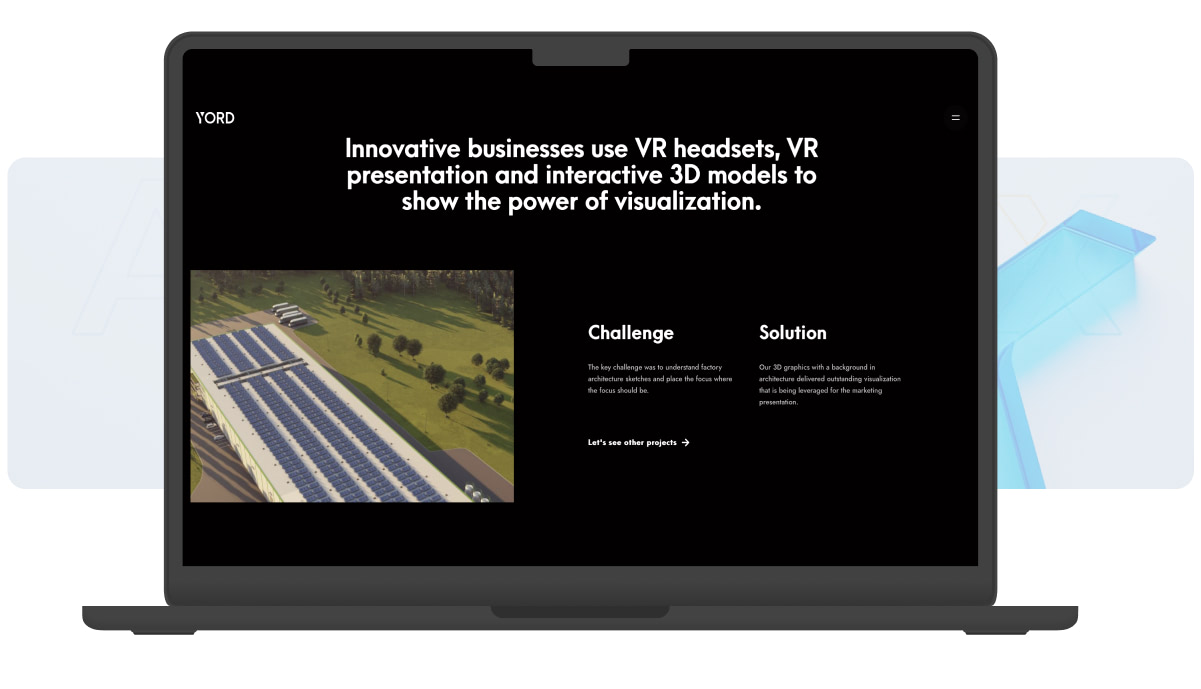
YORD Studio
YORD Studio is a custom developer of VR and AR solutions for a variety of businesses, among which are real estate and architecture. How can one benefit from VR and AR solutions offered by a company?
- Brokers and agents can sell faster with virtual tours, considering that 77% of individual looking for a property expect virtual tours first and face-to-face meetings second;
- Property and facility managers can alleviate the pain of space planning and resource management, especially in the hospitality industry;
- Construction and property development teams can reduce the risk of human error, lower construction costs, increase the jobsite safety, and avoid project delays with everything perfectly visualized and estimated during the pre-construction stage;
- Underwriters and appraisers can perform accurate property appraisals;
- Investors can make data-informed decisions by conducting due diligence remotely or, again, ‘inspecting’ the pre-constructed model of a building to invest in .
How Property Technology Has Changed the Real Estate Industry
Proptech disruption has brought innovation into the daily routine of almost every player in the real estate market, including property owners, tenants, investors, brokers, letting agents, etc.
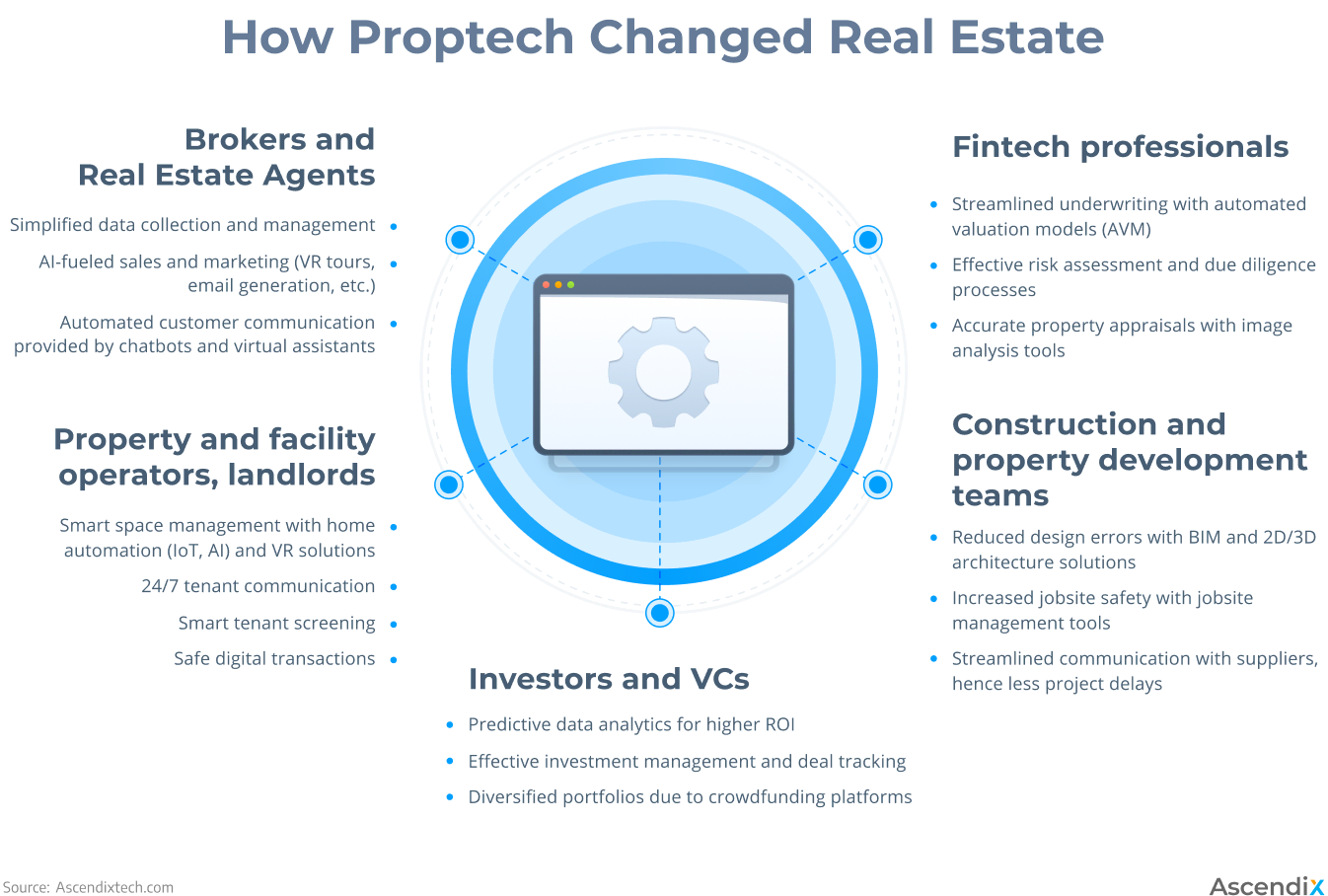
How Proptech Changed Real Estate
For brokers and real estate agents, the adoption of Proptech solutions means:
- Easier data collection & AI-driven marketing to screen and evaluate the development, investment, leasing, buying, and selling processes. Pair this up with the ever-expanding potential of proptech big data analytics for structuring and documenting large data sets, and you’ll find yourself fully equipped for conquering more deals.
- Automation of paperwork & cost reduction with document management tools, reporting systems and CRMs to streamline your brokerage back-office processes, hence saving time on more important tasks like market research, communicating with customers, and closing deals.
- Secure remote real estate transactions & self-help services (chatbots and virtual assistants) for a faster and easier buying experience. No more tons of paper to read and sign at closing and lower wait times,
- More engaging customer experience. With VR and AR immersive environment and simulation, brokers and agents can expand the audience reach and promote properties faster, since VR tours reduce the need for face-to-face interaction.
Property technologies have also changed the way landlords, property managers, facility operators, and tenants interact. Here is what Proptech has brought for both parties:
- Detailed 24/7 actionable insights into how tenants utilize the space, enabled by networks of smart devices and sensors (IoT). Managers can operate the property remotely with automated energy and security management. These solutions track the budling’s health, send real time alerts and overall serve as data centers accessible on both web and mobile platforms.
- Quality communication with tenants, maintenance teams, and any other parties involved. With information caught on time and the data stored, no detail from previous conversations will fall through the cracks! A great way to retain tenants, right?
- Streamlined booking for hospitality managers. The proptech definition partially overlaps with the hospitality industry as well. Here, hospitality property managers would definitely benefit from real-time data on property availability, streamlined payment, and email marketing, hence get better tenant experience.
The next are real investors and venture capitalists. Here is what has positively changed at the intersection and real estate and technology for them:
- Improved market research to track the development, investment, leasing, buying, and selling opportunities. With proptech portfolio sourcing solutions, an investor can gain access to the latest market trends and get insights on property ROI and assess investment risks with predictive analytics;
- Secure contracts with no “middle man” that might have misaligned interests in the property purchase and sale process;
- Streamlined transactions. E-signatures, online payment systems, and digital document management eliminate paperwork and help investors close deals faster.
For Fintech specialists, the current state of technology and real estate looks bright.
- New technologies like automated valuation models streamline the underwriting and property appraisal processes due to the access to real time data and third-party integration with credit systems for accurate borrower’s financial data;
- The emergence of real estate technology in fintech like money lending software reduces the time required for consulting clients with features like loan calculations. For instance, client can decide themselves whether they need to refinance residential properties without consulting a real estate specialist directly;
- Finally, the rise of new technologies like virtual tours and image analysis programs help fintech specialists assess loan-related risks faster.
The last category is construction and property development professionals. Whether they’re engaged in building and developing commercial buildings or residential properties, construction teams can all benefit from the new technology that includes automated budgeting, estimation, planning, and scheduling.
- Building information modeling (BIM) systems and jobsite management tools help teams ensure safety and avoid construction mistakes during the actual building process;
- Project management tools streamline communication with suppliers, hence, reduce the number of delays;
- Solutions like customer relationship management (CRM) systems and data analytics software provide users with centralized data management and data visualization & reporting for smart construction management.
Why Ascendix Among Proptech Real Estate Companies?
80% of companies implementing prop tech solutions benefit from better operations and deliver services of higher quality.
If you don’t want to lag behind real estate digitalization, you need to nurture your digital capabilities and adopt innovative approaches. With no previous experience in tech, it might not be an easy task to pour innovation and technology into your business straight away.
This is where Ascendix comes into play. We have been in the real estate market for more than 25 years and served the needs for technology in real estate of the biggest industry players, like JLL, Hanna Commercial Real Estate, Cresa, and others.
So, whatever your Real Estate niche is, we’ll fuel your business with Proptech innovation and:
- Reinforce your business with custom AI tools, provided by the top AI real estate company. Leverage machine learning, computer vision, natural language processing, and predictive modeling.
- Power up your business with custom-made & feature-rich CRM software (you can also make use of our ready-made AscendixRE CRM platform that has been tailored specifically for real estate specialists);
- Integrate third-party proptech solutions into your existing software;
- Modernize your legacy platforms to keep up with evolving customer needs and technologies;
- Bring robust proptech Big Data analytics to keep track of all your datasets and come up with accurate predictions and trends for your customer’s behaviors, property price, and potential risks;
- Automate your back-office processes and offload unnecessary paperwork to save time for the essentials of your business;
- Reduce costs spent on unnecessary brainwork with custom-developed web and mobile applications.
We make sure your proptech platforms, mobile and web applications are downright ready for success — you focus on your business core activities to be at the top of the game. Contact Ascendix and we’ll make your Real Estate Business stand out together.
Proptech Software Development Portfolio by Ascendix
Check out the overview of the proptech consulting and software development projects we delivered to our clients.
What is PropTech?
PropTech (property technology) implies the use of cutting-edge technologies like AI, NLP, VR, blockchain and others to create solutions that enhance the experience of sellers, buyers, tenants, landlords, and real estate professionals. It is used to help with property management, real estate transactions, construction, property research and other processes.
What are common PropTech examples?
Examples of PropTech include popular real estate platforms like Zillow and Airbnb, property management tools such as Buildium and AppFolio, smart home technology powered by IoT, virtual and augmented reality for property tours, AI tools for pricing and valuations, and even blockchain-based smart contracts.
How has PropTech changed the real estate industry?
It has digitized searches and transactions, enabled virtual tours, automated workflows, optimized building utilization with data analytics, and improved tenant and buyer experience. Technologies like AI and IoT have transformed back-office operations and customer interactions.
What is the role of PropTech?
Proptech, or property technology, is all the tech tools real estate experts use to optimize the way people buy, sell, research, market, and manage a property.
What is the use of PropTech?
The use of proptech lies in its ability to revolutionize the real estate industry by leveraging technology to streamline processes, enhance efficiency, improve user experiences, and drive innovation in property management, transactions, and sustainable practices.
Is PropTech limited to big developers and enterprises?
Not at all. PropTech is being used across residential, commercial, and even small-scale applications. Solutions can scale from solo landlords who use digital rent collection to large commercial operators who rely on predictive analytics, making it valuable for businesses of all sizes and sectors.
Alina Snisarenko , Head of Content
Alina is a proptech technology expert and a storyteller at Ascendix, investigating the real estate market and sharing her insights and tips with up-and-coming proptech startups, established real estate agencies, and industry stakeholders. She talks about real estate technology, business automation, and industry news.















 (36 votes, average: 4.79 out of 5)
(36 votes, average: 4.79 out of 5)
Good post. I certainly love it. Thanks!